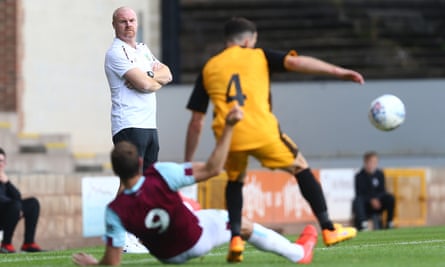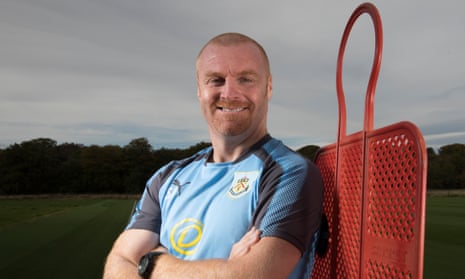One of the best things about taking your non‑sports‑fan daughter to interviews with sports stars is that you end up talking about so much more than sport. How else would I have ever seen Jamie Carragher blush as bright red as a Liverpool shirt when Grace asked him if he talked to his daughter about her periods? (No.) Yet also, what joy that it was a man, Maro Itoje, who, after explaining just how far it was permitted to go to hurt your opponent – very far, it sounded like to us – then gave what Grace admitted was as good a definition of feminism as we have heard while recording interviews for our podcast series, Football, Feminism and Everything in Between. “Feminism just means equality and freedom for women,” the England lock forward said.
Now we are in Sean Dyche’s home near Northampton, and the first thing thought you have is that if this was David Frost’s old show, Through the Keyhole, you would never guess that a former footballer and current manager lived here. “You won’t find any memorabilia in here,” he says, as he goes about making us a coffee. “No pictures, no old shirts, none of that. I’m not one of those football people who thinks and talks nothing but football. When I’m here, it’s not just my home, it’s the family home.” Neither his wife Jane, nor their daughter Alicia, are that keen on football, though son Max certainly is, and a good player to boot.
I have known Dyche for more than six years, ever since he took over at Burnley. I’m not sure I have ever got round to telling him that, not least on the word of Sir Alex Ferguson, I had been recommending Steven Pressley when Eddie Howe headed back to Bournemouth. Two Premier League spells and a Europa League adventure later, there are no doubters now. He has become a good friend, and I have got to see that behind the rough, gruff exterior is a thinking man, of deep values, and an acute football brain.
Once we have chatted over his impressions of last season and hopes for next – “guess we’ll just have to keep bringing rabbits out of the hat” – Grace joins us and all of a sudden we are talking about homophobia. Dyche is telling us that if a player told him he was gay, neither he nor anyone else in the dressing room would have any issue with it. “Does being gay mean you can’t be a good footballer?” he would say. “No. So let’s crack on.”
So what does it say about the culture of homophobia in football, Grace wants to know, that no current players in the English men’s game have come out as gay? There must be gay footballers, she says – he nods – but we don’t have any idea. “Hold on though,” he says. “Have you ever thought they might not want you to have any idea? This thing about ‘the next gay footballer’. Imagine the noise around that. They might not want it. You could not contain that information. All I am saying is that in my changing room, there would be no problem.”
We ask all our interviewees to mark themselves out of 10, both as football fans and as feminists. On feminism, he marks himself down, saying he is probably “around three, four out of 10”, though Grace marks him up as the conversation develops as he talks about his mother, his wife and his teenage daughter in terms which make her think he understands equality, but perhaps doesn’t understand that equality is all feminism is really about. “I grew up in an era where Dad worked, Mum looked after the family, and if I think of the qualities she brought to that – nurture and support are so valuable. She didn’t have a powerful job, but she was very powerful in my house, as powerful as any position anyone can hold in a business. You cannot underestimate the importance of that role in a home.”
His wife Jane, he says, is also “what you would call a housewife”, but cultural and social changes mean she does it differently to the last generation. “She doesn’t have a job but she teaches disabled children tennis, and in the last six and a half years I’ve lived two lives, working in Burnley, a lot of time up there, and Jane has been here with the children much more. She has done a remarkable job – I should tell her more. She is her own woman, she is bright, has a degree, but her thirst is not a career but to be the modern version of a housewife, not cooking and cleaning the whole time, but making sure everything here is ticking over and the kids are OK …
“It’s all about education. We are more educated. I am still learning. I am in a male-dominated world.”
Male-dominated or not, it is a world in which the modern manager must pay attention to the emotional needs of players in a way that makes his time as a player seem like a different age. Though he speaks with fondness bordering on reverence of Brian Clough, manager at Nottingham Forest when Dyche was a young apprentice, he describes his man management as “brutal”. “It was basically ‘do it, or disappear’. If he told you you played well, your head grew so big you couldn’t get through the door. If he said you played badly, you wanted to disappear under the floor. On a horse, with a top hat on.”
Today, he says, even if players play really badly, a manager needs to say ‘“you did well there, but here’s how you could have done better”. Clough really did say to players “get your hair cut, young man,” and the players did as they were told. He admits he occasionally suggests to his players they take a trip to the barber. “The idea of asking them to do errands for me, like Cloughie did, forget it. It’s just not happening.”
What he did learn from Clough, though, is “the value of simplicity”. He says: “Don’t overcomplicate. I mean, I never made it at Forest, but I was there three years and I saw him a lot, we were in and around the senior players and everyone knew their role, because he kept it simple. The game is a lot bigger, a lot more complicated in some ways, but you still have to try to keep it simple.
“Most people think footballers are thick. Some might be, academically, but they can see the game, strategically, tactically, in every way.”

Technically, tactically and physically, he feels the modern academy-trained footballer is in a different league to those of his era. Mentally, though, he is not so sure. “Life is really different. The earthiness has gone. Is there the same desire, dedication, drive to achieve? You are not going to be a player without the will and the desire and the belief … People now want the Ferrari and the big house, the kind of thing that never crossed my mind.”
He thinks Clough would struggle with a lot in the modern game. Agents. Social media. Tattoos! “It wouldn’t be ‘get your hair cut’ but ‘get rid of your tattoos, young man’.” Dyche is closer to Clough on this than he is to the players. “Everyone has a tattoo, thinking they’re different, but it means they’re all the same.” He mimics a player – “‘Oh, but my sleeve is different!’ – I reckon about five of our players don’t have one. Listen, I’m not anti-tattoo, I just don’t understand it.”
But does any of it matter, Grace interjects, provided they play well? “Ah,” he says, “but these things can get confusing. It is not the tattoos. It’s that you can start believing in these things more than the job. The car, the lifestyle, it becomes bigger than the job, it softens you and swerves you off the job, takes the edge away.” Ironically, given that the tattoo-isation of modern football and modern Britain owes as much to David Beckham as anyone else, he cites him as the best example of someone who was able to do all the off-field stuff while remaining at the top of his game on it. “Madness all around him, yet delivering all the time.”
In the end, he says, for all the knowledge that data and analytics can give you, managers still have to be able to make human judgments about players. “If there is a flaw in the academy system it’s that they try to tell them everything. Kids are taught the same. They look the same. So you’re constantly looking for the X factor. It’s the hardest thing, that mystical ingredient, instinct, the four-second hit, like/dislike, it can come unbelievably quickly. Sometimes I can smell it.”
With Dwight McNeil, the teenager who broke into the first team from the youth side last season, he says: “We might show him a few clips, give him a few prompts. But the more he works it out himself the better, far better than me telling him everything. I’m a great believer in self-learning. People have asked what have I done to bring him on. Part of it is leaving him alone. I am still learning about Dwight as a person. He had a knock at 14, he was rejected by Man U. That can be a powerful thing. He stuck at it. That’s a good sign. He listens. That is a good sign. At Burnley we have to have them all on top form. We are not making big statements about how superior we are. The basics have to be there, delivery for the team, not just yourself.”
Annoyingly, he disabused Grace of the notion, which I have happily created in my own home, that I am something of a football adviser to him and his No 2 Ian Woan. “Oh my God, this thing about him advising me. I don’t tell him about politics and he doesn’t tell me about football. He’s a fan. He may be a fan who knows more than most, because he knows a lot of people, but he is a fan.”
As for his politics, Dyche is a remainer – though he somewhat surprised me in naming Margaret Thatcher in his “six-a-side team to save the world”.
“You’re doing this to wind me up now, aren’t you?”
“When I was growing up, she was just such a big figure, doing so much, never off the news and I thought my God, that is some woman, in the world as it was then, you must have something special to be doing that job the way you do it.”
Fair point, I said to Grace. “Feminist in a way,” she said. “I reckon he is a seven out of 10.”
Sean Dyche’s interview for the Football, Feminism and Everything in Between podcast is available now
